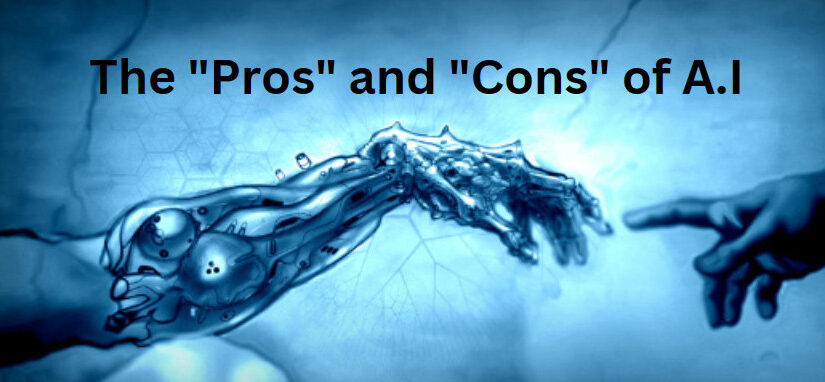
The Affiliate Marketing Nomad.
Artificial intelligence
AI is already significantly influencing internet marketing, as you are probably aware, and over the next few years, this trend will only pick up speed.
AI is being utilized to obtain useful insights about customer behavior, tailor customer experiences, and automate processes.
I thus asked “Monica” and “her” “A.I peers” to outline how, over he course of the next few years, artificial intelligence will impact affiliate marketing and people who work in the industry, from newbies to seasoned veterans.
This is not 100% AI-written, most of the content has been repurposed and refined by myself. If I were to give a “guesstimate” on any percentage written by AI or myself, I would say 70/30, with myself being the 70%.
Call me “old fashioned” but I still prefer the human touch. 8-). But the convenience of having such a versatile tool on hand is reason enough to use it in the first place.
I have heard people make such sweeping statements like..”This is the death of human thought” and it reminds me of when pocket calculators were first introduced, (Yes, I am THAT old) and the old maths teachers were incensed that the 15 times table was no longer enforced. Lol.
 The Immediate Impact Of AI On Affiliate Marketing.
The Immediate Impact Of AI On Affiliate Marketing.
The following are some particular instances of how AI is anticipated to be applied in affiliate marketing:
To create more effective and efficient affiliate networks that can more precisely track outcomes and link affiliates with the proper goods and services to promote.
Tools for affiliate marketing: To make it easier to choose which goods and services to advertise, who to target, and how best to monitor the outcomes.
Conversion optimization: To assist in determining the most effective call-to-actions, landing sites, and ad language to raise conversion rates.
Product recommendation engines: To assist in making the appropriate product recommendations to their audience, potentially increasing sales.
Tools for content generation: To make it easier and faster to produce high-quality content.
Social media marketing tools: To assist in more efficiently targeting their audience and automating social media marketing duties.
Email marketing tools: To assist in sending automated emails depending on customer behavior, segmenting their email lists, and personalizing their email content.
Thus, there are a lot of possible uses for AI in affiliate marketing. We may anticipate seeing even more creative and practical use of AI to enhance affiliate marketing outcomes as technology advances.
The Impact Of AI On Newbies.
It is anticipated that AI will facilitate newbies’ entry into and success in affiliate marketing. Beginners may write content, choose which goods and services to promote, target the correct audience, and monitor their progress with the use of AI-powered tools. This can help newbies get off to a great start and save them a ton of time and effort.
Beginners will still need to understand the fundamentals of affiliate marketing, but AI can make this process easier and faster for them.
Affiliate platforms such as “Wealthy Affiliate” will continue to attract both the newer and more established Affiliate marketers. Especially those like Wealthy Affiliate who continue to integrate and promote Artificial intelligence within the platform.

Overall, the good news is that in the next few years, AI is predicted to increase novices’ access to and profitability from affiliate marketing.
Possible Drawbacks for AI in the Next Few Years
Naturally, nothing is flawless. The following are some anticipated issues with AI:
– costly to establish and maintain
– difficult to use and requires specific knowledge and abilities
– if it is not trained on a varied dataset, it may be biased.
– could result in job displacement as AI automates more activities
Will Illiterate A.I Affiliate Marketers Fall Behind?
If affiliate marketers don’t use AI in the next five years, it’s unlikely that they will fall completely behind. Those who do, however, use AI-powered tools and tactics stand to gain a sizable competitive edge.
In the next five years, AI has the potential to completely transform affiliate marketing. Affiliate marketers will probably be well-positioned for success in the future if they can use AI-powered tools and tactics.
How Do You Feel?
Ultimately, it is up to each affiliate marketer to decide whether or not to use AI.
How do you think artificial intelligence (AI) will impact affiliate marketing in the upcoming years?
Do you favor or oppose the use of AI in online marketing?
Have you begun studying artificial intelligence and incorporating it into your company yet?
Here are some other posts I have done on my Affiliate marketing website.
This is the first post I have done that brings together two of my online “babies” ” Kool Affiliates” which gives advice and feedback on all things to do with “Affiliate marketing”
This also has my “social media marketing’ sites as well, which are listed below. feel free to join me on any of these sites.
My Links
These are the social groups I belong to, please feel free to join me on any of my social media channels. I love hearing feedback as it helps me move and grow.
- @stephen.hey.35/ Instagram
- @stephen.hey.35 Facebook.
- @Stephen57967043 X. ( Twitter)
- pinterest.com/stv_hey/_created/ Pinterest.
- linkedin.com/in/stephen-hey-8b949b32/ Linkedin
- stephenheysspace.quora.com/ Quora
- youtube.com/channel/UC-EsPxeTrYUgGkW4Y3ApKOQ YouTube
Kool Affiliates.
1) “How to Use AI for Affiliate Marketing”
What AI tools do we have and how can we use them to gain the best responses possible?
2) “The Summer of AI and Prompt Engineering”
How to use prompt engineering to maximize your A.I enquiries.
3) “How Can I Make Money with ChatGPT?”
Ideas for learning and earning with ChatGPT
Conclusion.
Whether we like it or not, AI is here to stay, and for those of us who enjoy using it and can provide value-added benefits to our blogs, an exciting time is ahead of us.
I firmly believe this is the new “GOLD RUSH” and we can make as much as we like if we are receptive to new ideas.
If you wish to collaborate or even just bounce around some ideas, I am happy to talk with you.
Steve Hey 
Some links on this site may be affiliate links, and if you purchase something through these links, I will make a commission on them. There will be no extra cost to you and, you could actually save money. Read our full affiliate disclosure here.


